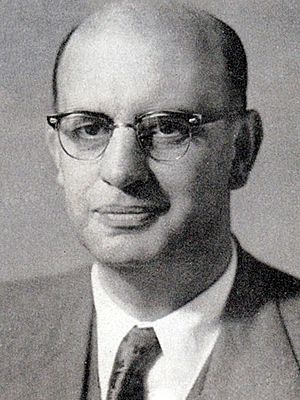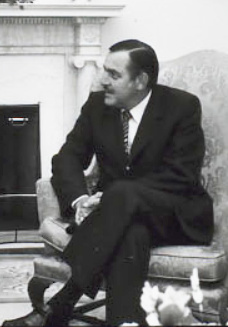P. W. Botha facts for kids
Quick facts for kids
P. W. Botha
DMS
|
|
|---|---|

Botha in 1962
|
|
| 6th State President of South Africa | |
| In office 3 September 1984 – 14 August 1989 Acting until 14 September 1984 |
|
| Preceded by | Marais Viljoen as ceremonial State President Himself as Prime Minister |
| Succeeded by | Chris Heunis (acting) F. W. de Klerk |
| 8th Prime Minister of South Africa | |
| In office 9 October 1978 – 14 September 1984 |
|
| President | John Vorster Marais Viljoen |
| Preceded by | John Vorster |
| Succeeded by | Office abolished |
| Minister of Defence | |
| In office 30 March 1966 – 28 April 1981 |
|
| Prime Minister | Hendrik Verwoerd John Vorster Himself |
| Preceded by | J. J. Fouché |
| Succeeded by | Magnus Malan |
| Minister of Community Development and Coloured Affairs | |
| In office 8 October 1961 – 30 March 1966 |
|
| Prime Minister | Hendrik Verwoerd |
| Preceded by | Office established |
| Succeeded by | Willem Adriaan Maree |
| Member of the South African House of Assembly from George | |
| In office 1948–1958 |
|
| Personal details | |
| Born |
Pieter Willem Botha
12 January 1916 Paul Roux, Orange Free State, Union of South Africa |
| Died | 31 October 2006 (aged 90) Wilderness, Western Cape, Republic of South Africa |
| Political party | National (1946–1990) |
| Spouses |
Anna Elizabeth Rossouw
(m. 1943; died 1997)Barbara Robertson
(m. 1998) |
| Children | Rossouw, Pieter Willem, Elanza, Amelia, Rozanne |
| Alma mater | Grey University College |
| Profession | Politician |
| Signature |  |
Pieter Willem Botha (born January 12, 1916 – died October 31, 2006) was a South African politician. People often called him P. W. or The Big Crocodile. He was the last Prime Minister of South Africa from 1978 to 1984. After that, he became the first State President of South Africa from 1984 to 1989.
Botha was first elected to Parliament in 1948. He was strongly against black people having majority rule. However, his government did try to make some changes. During his time, there was a lot of unrest and unfair treatment of people by the government. Botha stepped down as leader of the National Party in 1989 after he had a stroke. He was later asked to leave the presidency too.
In 1992, when F. W. de Klerk held a vote about ending apartheid, Botha told people to vote "No." He said De Klerk's government was being careless by allowing black majority rule. Later, in 1998, Botha refused to speak to the Truth and Reconciliation Commission (TRC). This commission was set up by Nelson Mandela's government to look into past wrongs. Botha was fined and given a suspended jail sentence for this, but the punishment was later removed after he appealed.
Contents
Early Life and Education
Pieter Willem Botha was born on a farm in the Paul Roux area of the Orange Free State Province. His parents were Afrikaner. His father fought against the British in the Second Boer War. His mother was held in a British camp during the war.
Botha went to school in Paul Roux and then Bethlehem. In 1934, he started studying law at Grey University College. But he left at age 20 to start a career in politics. He began working for the National Party in the Cape Province. Before World War II, Botha joined a group called the Ossewabrandwag. This group was sympathetic to Germany's Nazi Party. However, Botha later changed his views and spoke out against the Ossewabrandwag.
In 1943, Botha married Anna Elizabeth Rossouw, known as Elize. They had five children together.
His Time in Parliament
At 30, Botha became the head of the National Party Youth in 1946. Two years later, he was elected to the House of Assembly for the George area. This was the election where the National Party began its 46 years in power.
In 1958, Botha became Deputy Minister of Internal Affairs. In 1961, he became Minister of Community Development. In 1966, he was made Minister of Defence. He held this job for 14 years. During this time, the South African Defence Force (SADF) grew very strong. It was involved in the South African Border War.
In 1978, John Vorster resigned as Prime Minister. Botha was then chosen by his party to be the new Prime Minister. He wanted to make changes to the country's laws. He hoped to create a system where black "homelands" could have more "self-rule." He also wanted to give more rights to Coloured and Indian people. He famously said, "We must adapt or die."
As Prime Minister, Botha also led the defence department until 1980. He worked to make South Africa's military stronger. He tried to improve relations with countries like the United States. He argued that keeping the apartheid government was important to stop the spread of communism in Africa.
Botha's main opponents in parliament were from the Progressive Federal Party. Later, the Conservative Party, led by Andries Treurnicht, became the main opposition.
In 1977, as Minister of Defence, Botha started a secret program to build nuclear bombs. South Africa built six bombs, which were later destroyed in the 1990s. Botha also kept South Africa in control of South-West Africa (now Namibia). He also helped build up military units like 32 Battalion. South Africa was involved in the Angolan Civil War until the late 1980s. To keep the military strong, all white South African men had to serve in the army.
Becoming State President
In 1983, Botha suggested a new constitution. White people voted on this new plan. It created two new parts of parliament: one for Coloured people and one for Indians. These three parts of parliament would handle issues for their own communities. But important issues like foreign policy had to be approved by all three.
The plan did not include any way for the black majority to be part of the government. Black people were considered citizens of their 'homelands' (called Bantustans), not South Africa. These homelands were supposed to become independent countries. During Botha's time, some homelands like Ciskei became "independent." But no other country in the world recognized them, and they still relied on South Africa. Many black leaders, like Mangosuthu Buthelezi, refused independence for their homelands.
The new constitution also changed the government system. The Prime Minister's job was removed, and its duties were combined with the state president. This made the president a very powerful leader. Botha was elected as the first state president under this new constitution on September 14, 1984.
Many people criticized the new constitution because it did not give black people a role in government. But some international observers thought it was a first step towards reform. Botha also passed strict laws that limited freedom of speech. This helped him control criticism of his government.
Many Western countries, like the United States and the United Kingdom, debated putting economic sanctions on South Africa. By the late 1980s, foreign investment in South Africa dropped. This started to hurt the country's economy.
Apartheid Government Under Botha
Botha made some small changes to apartheid rules. He made interracial marriage legal again, which had been banned. He also made it easier for non-white people to live in certain areas. In 1988, a new law allowed "Open Group Areas" where different races could live together. But these areas needed government permission and support from local white residents.
Botha also became the first South African leader to talk with Nelson Mandela, who was in prison.
However, even these small changes were too much for some hardliners in Botha's party. They left to form the Conservative Party. But the changes were not enough for the opposition. As unrest and violence grew, Botha refused to give political power to black people. He also increased security measures against anti-apartheid activists. He refused to negotiate with the African National Congress (ANC).
In 1985, Botha gave a famous speech called the Rubicon speech. In it, he refused to give in to demands from the black population, including freeing Mandela. Botha's defiance made South Africa even more isolated. This led to more economic sanctions and a drop in the value of the South African currency. The next year, he declared a nationwide state of emergency. He famously said, "This uprising will bring out the beast in us."
As other countries took action against South Africa, unrest grew among the black population. The ANC and neighboring black-majority governments supported this. In May 1986, Botha warned neighboring countries not to interfere in South Africa's affairs. Four days later, he ordered air strikes on targets in Lusaka, Harare, and Gaborone. These targets included offices of exiled ANC activists. Botha said these raids were just a "first installment."
Even with the small changes Botha made, the apartheid years under his leadership were very harsh. Many people were held without trial, and some were tortured or killed. The TRC later found Botha responsible for serious human rights violations. They also found he had approved "unlawful activity." Botha never apologized for apartheid. In a 2006 interview, he said he had no regrets about how he ran the country. He denied thinking black South Africans were inferior. But he admitted that some white people were "racists at heart."
End of His Time in Power
Botha's power began to fade after a meeting between Ronald Reagan (US) and Mikhail Gorbachev (Soviet Union) in 1988. This meeting helped solve the problem of Namibia. A peace agreement was signed in New York in December 1988. It said that Soviet military aid would stop and Cuban troops would leave Angola. In return, South Africa would give up control of Namibia and allow elections there.
On January 18, 1989, Botha, then 73, had a mild stroke. This stopped him from attending a meeting. On February 2, 1989, Botha resigned as leader of the National Party. He expected his chosen successor, Barend du Plessis, to take over. But the party chose F. W. de Klerk instead. De Klerk quickly showed he wanted reforms.
In March 1989, the National Party elected De Klerk as state president. But Botha refused to resign from the presidency. He said he could stay until March 1990 and was even thinking of running again. After some difficult meetings, Botha and De Klerk agreed: Botha would retire after the September elections. This would allow De Klerk to become state president.
However, Botha suddenly resigned from the presidency on August 14, 1989. He complained that De Klerk had not asked him about a planned visit to Kenneth Kaunda, the President of Zambia. Botha said, "The ANC is enjoying the protection of president Kaunda and is planning insurgency activities against South Africa from Lusaka." He felt ignored by his own ministers.
De Klerk became acting state president that day. The next month, he was chosen to be the new state president. De Klerk soon announced that laws against anti-apartheid groups, including the African National Congress, would be removed. He also announced the release of Nelson Mandela. De Klerk's time as president led to the end of apartheid. It also led to South Africa's first democratic elections in 1994, where people of all races could vote.
After Botha's death in 2006, De Klerk said their relationship was often difficult. He did not like Botha's strong leadership style.
Retirement
Botha and his wife Elize retired to their home in Wilderness, a town on the Indian Ocean coast. Elize died in 1997. Botha later married Barbara Robertson in 1998.
Botha mostly stayed out of the public eye. Many believed he still disagreed with De Klerk's reforms. He also left the Afrikaner Broederbond, a secret organization.
Botha refused to speak to the Truth and Reconciliation Commission (TRC). This commission was set up to investigate crimes from the apartheid era. The TRC found that Botha had ordered the bombing of the South African Council of Churches headquarters in 1988. In August 1998, he was fined and given a suspended jail sentence for not testifying about human rights violations. These violations were approved by the State Security Council, which he led as president.
In June 1999, Botha successfully appealed his conviction. The court found that the notice asking him to appear before the TRC was not legally correct.
Death
Botha died from a heart attack at his home in Wilderness on October 31, 2006. He was 90 years old. Many of his former opponents reacted kindly to his death. Former President Nelson Mandela said that while Botha was a symbol of apartheid to many, he also helped pave the way for a peaceful agreement in South Africa.
President Thabo Mbeki announced that flags would be flown at half-mast for the former head of state. Botha's family declined an offer of a state funeral. A private funeral was held on November 8 in George, where Botha was buried. Mbeki attended the funeral.
Awards
 Taiwan: Order of Propitious Clouds with Special Grand Cordon (1980)
Taiwan: Order of Propitious Clouds with Special Grand Cordon (1980)
Images for kids
See also
 In Spanish: Pieter Willem Botha para niños
In Spanish: Pieter Willem Botha para niños



